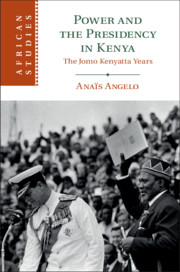Book contents
- Power and the Presidency in Kenya
- African Studies Series
- Power and the Presidency in Kenya
- Copyright page
- Dedication
- Contents
- Acknowledgments
- Introduction
- 1 Kenyatta’s Stateless Political Imagination
- 2 From Prison to Party Leader, an Ambiguous Ascension (1958–1961)
- 3 Kenyatta, Land, and Decolonization (1961–1963)
- 4 Independence and the Making of a President (1963–1964)
- 5 Kenyatta, Meru Politics, and the Last Mau Mau (1961/3–1965)
- 6 Taming Oppositions: Kenyatta’s “Secluded” Politics (1964–1966)
- 7 Ruling over a Divided Political Family (1965–1969)
- 8 “Kenyatta Simply Will Not Contemplate His Own Death” (1970–1978)
- Conclusion
- Sources
- Bibliography
- Index
- African Studies Series
8 - “Kenyatta Simply Will Not Contemplate His Own Death” (1970–1978)
Published online by Cambridge University Press: 11 October 2019
- Power and the Presidency in Kenya
- African Studies Series
- Power and the Presidency in Kenya
- Copyright page
- Dedication
- Contents
- Acknowledgments
- Introduction
- 1 Kenyatta’s Stateless Political Imagination
- 2 From Prison to Party Leader, an Ambiguous Ascension (1958–1961)
- 3 Kenyatta, Land, and Decolonization (1961–1963)
- 4 Independence and the Making of a President (1963–1964)
- 5 Kenyatta, Meru Politics, and the Last Mau Mau (1961/3–1965)
- 6 Taming Oppositions: Kenyatta’s “Secluded” Politics (1964–1966)
- 7 Ruling over a Divided Political Family (1965–1969)
- 8 “Kenyatta Simply Will Not Contemplate His Own Death” (1970–1978)
- Conclusion
- Sources
- Bibliography
- Index
- African Studies Series
Summary
Chapter 8 covers the last decade of Kenyatta’s life and rule. As signs of Kenyatta’s age became more visible, the 1970s were not only marked by an increasingly tense struggle for succession, but also by a more acute “tribalisation” of politics. The assassination, in 1975, of the promising young Kikuyu leader J. M. Kariuki, whose dissident politics alarmed the government, signalled a clear descent into factionalism. This chapter shows that Kenyatta was unnerved by factional disputes and rising popular disaffection. Fears of a potential coup against his regime led him to tighten his control over state institutions. The succession of Daniel arap Moi upon Kenyatta’s death in 1978 confirmed that the core of Kenya’s post-colonial state was the president’s isolated status and unrivalled ambiguity, which is the central argument of this book. By expressing his preference for Moi as a potential successor, Kenyatta not only chose a non-Kikuyu, but an isolated political player, like himself ten years earlier. Far from preparing the ground for tribal inclusion in the top sphere of government, Kenyatta’s choice helped the institution of the president to prevail over a divided elite, to compensate for weak institutional ties through presidential favours, and to preserve parochial family interests.
- Type
- Chapter
- Information
- Power and the Presidency in KenyaThe Jomo Kenyatta Years, pp. 250 - 265Publisher: Cambridge University PressPrint publication year: 2019

